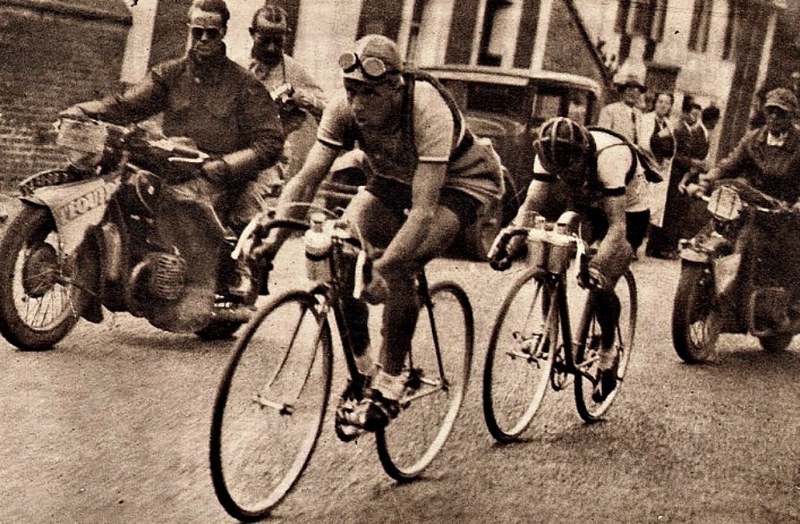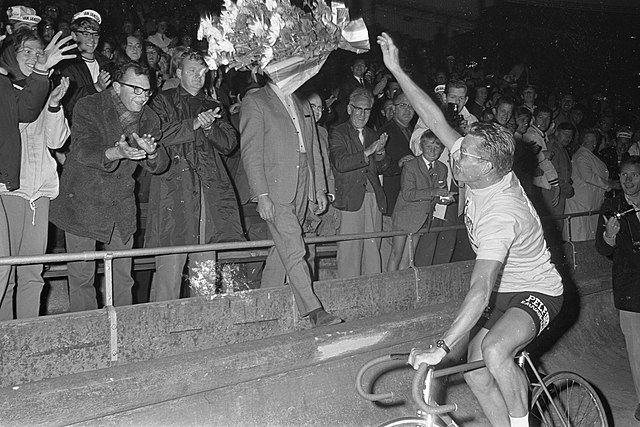Winning the Tour de France on the very last day. It doesn't happen every year, but since the first Tour de France in 1903, 3 riders have succeeded: Jean Robic, Jan Janssen and Greg Lemond. Tadej Pogacar is also included in this because the leader is traditionally no longer attacked on the last day, but Pogacar will receive the yellow jersey in 2020 on the penultimate day.
It is a fact that an overall victory on the last day brings immense joy to the winner and immense sadness to the loser.
Jean Robic (Tour of 1947)
On the eve of the last stage of the Tour of 1947, from Caen to Paris, the overall victory seems to be reserved for the Italian Frenchman Pierre Brambilla. He has a lead of 53″ on Ronconi and 2'58” on Robic and there is no doubt that Brambilla will hand over this lead.
Jean Robic, however, still dreams of the final victory (reportedly he promised his new bride to take home the yellow jersey) and attacks at the start of the climb of the Bonsecours, above Rouen.
Edouard Fachleitner, fellow countryman and teammate of Robic, joins the attack. With 140 km to go, the 2 riders make a pact and systematically extend their lead. A strange event because at that time the Tour was ridden with national teams and both Robic and Brambilla are both part of the French team.
As a result, Brambilla is in a pinch and is no less than 13 minutes behind in the Parc des princes in Paris, which means that he tumbles to third place in the final ranking at more than 10 minutes from Robic. 2nd in the final standings is Fachleitner who was part of the breakaway.
Impossible that such a thing would still happen in today's cycling, which is yet another proof that cycling used to be much more an individual than a team sport.
Jan Janssen (Tour of 1968)
On the last day of the Tour de France 1968, 2 more stages are on the program: a short ride from Auxerre to Melun in the morning and a time trial over 55 km from Melun to Paris. The recently deceased Herman Van Springel is in the lead ahead of Gregorio San Miguel and Jan Janssen. The difference between the 2nd and the 3rd is only 12″ and 16″.
However, it is not immediately feared that one of the two will steal the victory from Van Springel, who is the better time trialist. Who is capable of that is Ferdinand Bracke, a gifted time trialist and holder of the world hour record at the time. Bracke is only 51 seconds from Van Springel.
There was a great surprise when both Van Springel and Bracke were given a considerable time difference by Janssen, who immediately won his 1st and only Tour de France. After all, from 1969 onwards, Eddy Merckx's monopoly is there.
Jan Janssen wins the 1968 Tour with a lead of only 38 seconds over Van Springel. The smallest difference then ever and only reduced to 8 seconds 21 years later (see below). 3rd in the final standings eventually becomes Bracke at 3'03".
Janssen's overall victory was a surprise and immediately after his victory questions were asked how it was possible that the better time trialists Van Springel and Bracke had to lose out against the lesser time trialist Janssen.
Greg Lemond (Tour 1989)
The 1989 Tour de France was one of the most exciting ever with an unprecedented denouement. Protagonists were the Frenchman Laurent Fignon and the American Greg Lemond. Both had already won the Tour and the yellow jersey changed shoulders several times.
On the final day, a time trial of just 24.5km, for practically all connoisseurs, was too short for Greg Lemond to wipe out his 50-second gap on jersey wearer Laurent Fignon. However, Lemond believed in his chances and knew that with his aerodynamic helmet and triathlon handlebars he could do as much as 2 seconds better than Fignon per kilometer.
Back then, aerodynamics were not given as much importance as now and it is clear that both the helmet and the triathlon handlebars were seriously underestimated then. Lemond had used the wheel earlier in this Tour during a time trial making it difficult for Cyrille Guimard, then Fignon sports director, to protest during this final time trial. It was now too late for that.
Dit bericht op Instagram bekijken
The result of these technological feats that Lemond used ensured that the 1989 Tour ended as an unforgettable event. Lemond put on Fignon 58 seconds and won the 1989 Tour de France on the final day with a difference of just 8 seconds, or 82 meters on a total distance of 3285 km.
To this day still the smallest difference ever and probably never to be matched again, although one never knows.
A beautiful book about this legendary victory is the book three weeks eight seconds from Nige Tassel





